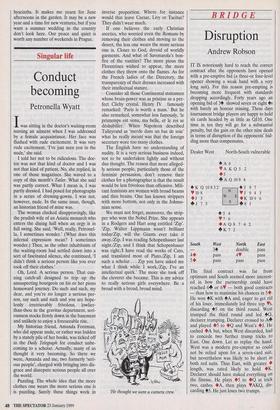Singular life
Conduct becoming
Petronella Wyatt
Iwas sitting in the doctor's waiting-room nursing an ailment when I was addressed by a female .acquaintance. Her face was flushed with rude excitement. It was very rude excitement. 'I've just seen you in the nude,' she said.
I told her not to be ridiculous. The doc- tor was not that kind of doctor and I was not that kind of patient. No, she replied, in one of those magazines. She waved to a copy of this month's Tatler. What she said was partly correct. What I mean is, I was partly dressed. I had posed for photographs in a series of dressing-gowns. I was not, however, nude. In the same issue, though, an historian friend of mine was.
The woman clucked disapprovingly, like the prudish wife of an Asiatic monarch who enters the dining hall when an orgy is in full swing. She said, 'Well, really, Petronel- la, I sometimes wonder.' (What does this infernal expression mean? I sometimes wonder.) Then, as the other inhabitants of the waiting-room had settled down into a sort of fascinated silence, she continued, 'I didn't think a serious person like you ever took off their clothes.'
Oh, Lord. A serious person. That cun- ning catch-all designed to trip up the unsuspecting bourgeois on his or her pious homeward journey. Do such and such, my dear, and you're no longer a serious per- son, say such and such and you are hope- lessly irretrievably frivolous, lowlier- than-thou in the gravitas department, seri- ousness stocks firmly down in the basement and unlikely to enjoy a foreseeable rise.
My historian friend, Amanda Foreman, who did appear nude, or rather was hidden by a stately pile of her books, was ticked off in the Daily Telegraph for conduct unbe- coming to a scholar. Actually, many of us thought it very becoming. So there we were, Amanda and me, two formerly 'seri- ous people', charged with bringing into dis- grace and disrepute serious people all over the world.
Puzzling. The whole idea that the more clothes one wears the more serious one is is puzzling. Surely these things work in inverse proportion. Where for instance would that leave Caesar, Livy or Tacitus? They didn't wear much.
If one believes the early Christian ascetics, who worried even the Romans by removing their clothes and moving to the desert, the less one wears the more serious one is. Closer to God, devoid of worldly garments. And what of Savonarola's bon- fire of the vanities? The more pious the Florentines wished to appear, the more clothes they threw onto the flames. As for the French ladies of the Directory, the transparency of their dresses increased with their intellectual stature.
Consider all those Continental statesmen whose brain-power was as pristine as a per- fect Clichy crystal. Henry IV famously remarked: 'Paris is worth a mass.' But he also remarked, somewhat less famously, 'le printemps est venu, ma belle, et le roi se deshabiller.' When Napoleon described Talleyrand as `merde dans un bas de soie' what he really meant was that the foreign secretary wore too many clothes.
The English have no understanding of nudity. It is a very serious business indeed, not to be undertaken lightly and without due thought. The reason that more alleged- ly serious people, particularly those of the feminist persuasion, don't remove their clothes for a photographer is that the result would be less frivolous than offensive. Mili- tant feminists are women with broad beams and thin brains. One has known strippers with more bottom, not only in the Johnso- nian sense.
We must not forget, moreover, the strip- per who won the Nobel Prize. She appears in a Rodgers and Hart song entitled 'Zip'. `Zip, Walter Lippmann wasn't brilliant today/Zip, will the Giants ever take it away./Zip. I was reading Schopenhauer last night./Zip, and I think that Schopenhauer was right./I have read the works of Cato, and translated most of Plato./Zip, I am such a scholar . . . Zip you have asked me what I think while I work./Zip, I've an intellectual quirk.' The more she took off the cleverer she became. This is my advice to really serious girls everywhere. Be a broad with a broad, broad mind.
`He thought we were a camera crew.'


























































 Previous page
Previous page